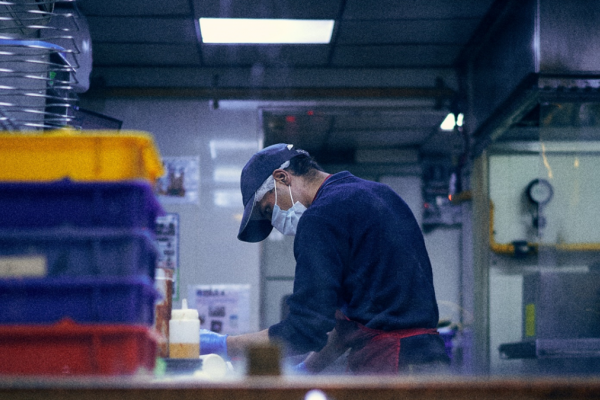Why the NDP has become the unofficial opposition during the COVID-19 pandemic
Had the Liberals held a majority in Parliament, Canada’s pandemic response may have been much worse

NDP Leader Jagmeet Singh speaks with reporters on Parliament Hill as the House of Commons resumes following a five-week suspension due to the COVID-19 pandemic. Screenshot taken from a YouTube webcast.
By all accounts, the Liberal’s response to the COVID-19 pandemic has been lukewarm at best. But a look at our neighbours down south makes it clear that things could be much worse if we still operated within a rigid two-party system.
One central reason Canadians are faring better that our southern counterparts is because the Liberal Party is in a minority position.
Historically, Canada has seen institutional leaps during periods of minority government. Notable achievements include the close collaborations between the NDP and the Liberal minority government headed up by Lester B. Pearson in the 1960s, which ushered in the Canada Pension Plan, the Canada Assistance Plan, and our single-payer medical system.
Today, we are seeing the NDP continue the tradition of pressuring the Liberals from the left, albeit not with the same verve or progressive passion.
Expanding the eligibility of the CERB
Rather than freeze rent and all mortgage payments as other countries such as France and Italy have done, Finance Minister Bill Morneau opted for a means-tested plan—the Canada Emergency Response Benefit (CERB)—that, originally, left three million people without relief and still renders more than 100,000 people uncovered.
Under pressure from the NDP, the Liberals have continued to expand the CERB’s eligibility rules. Students are now eligible for an almost-CERB-equivalent: the Canada Emergency Student Benefit of $1,250, with an extra $500 for students with disabilities or dependents. Additionally, the NDP was able to get the Liberals to commit to distributing a payment of $300 to every senior receiving the Old Age Security (OAS) pension, and an extra $200 to those receiving the Guaranteed Income Supplement (GIS) to help offset some of the costs of the crisis.
Pushing for universal pharmacare
One of the NDP’s main campaign pledges in the last election was universal pharmacare. In the midst of a pandemic in which millions of Canadians have lost their jobs and their drug coverage plans, this policy is all the more important.
After the Canadian Labor Congress launched a campaign asking the federal government to cover workplace medication benefits, the NDP amplified their demands and continue to ask the Liberals to produce a plan for drug coverage now, as a first step towards universal, long-term pharmacare.
No bailouts for companies registered in tax havens
After Poland and Denmark announced that they would deny bailout funds to companies that operate in offshore tax havens, the NDP and the Bloc Québécois (BQ) began to pressure the Liberals to do the same in Canada. NDP leader Jagmeet Singh tweeted:
Companies in Denmark registered in tax havens are not eligible for government help
— Jagmeet Singh (@theJagmeetSingh) April 21, 2020
We asked the PM if he would do the same & he refused to answer
Rich companies who cheat the public by not paying all their taxes shouldn’t get help from the public#BailOutPeopleNotCorporations https://t.co/8bbR7bn9Ka
After originally rejecting this idea, the Liberals seem to have felt the pressure. During the House of Commons’ first virtual sitting in late April, Trudeau nonchalantly announced, in French, that “those who evade or avoid tax will not receive aid.”
Perhaps not surprisingly, this did not last. The next day, Trudeau appeared to back away from the commitment after being pressed by BQ leader Yves-François Blanchet. The Liberals have since clarified that only companies convicted of illegal tax evasion will be exempted from governmental aid. The takeaway, however, is that the NDP (and the BQ) is helping to push Canada’s ruling party to the left, bit by bit, when it fails to prioritize ordinary working people over capitalists and the wealthy.
Individual NDP members are standing out
Multiple NDP caucus members are publicly talking about the importance of a people-centred bailout, which would expand the NDP’s broad objectives.
Just as he did during his re-election campaign, Alexandre Boulerice (MP for Rosemont—La Petite-Patrie and the NDP’s ethics critic) has been blasting the Liberal Party for its lenience on corporate tax evaders. With the help of Hamilton MP Matthew Green, he has committed to holding Trudeau to account by actively monitoring profiteering during the pandemic.
Manitoba NDP MPs Niki Ashton and Leah Gazan have also criticized the means-tested nature of the federal government’s COVID-19 response measures including the CERB, saying they leave many Indigenous peoples behind. According to Gazan, the fact that Indigenous peoples—who comprise three percent of Canada’s population—are receiving less than one percent of the allocated funding is “unacceptable, especially because the federal government has identified Indigenous peoples at greater risk due to long-standing underfunding for essential services.”
Elsewhere, East Vancouver MP Jenny Kwan has given some much needed support to the fight to ensure that immigrants receive confirmation for eligibility for future sponsorship.
These fruitful discussions on progressive policies between NDP MPs is happening mostly online and on social media networks, and, like the NDP’s lobbying efforts at large, are very seldom being covered by major news outlets. As a result, most Canadians are completely unaware of the NDP’s efforts.
Profit over people
Imagining what the federal response would have been had the Tories wielded more sway in the (virtual) House of Commons is a disconcerting thought.
Conservative Party Finance Critic Pierre Poilievre went so far as to say, in a rebuke of the CERB and alleged cheaters of the system, that “[t]here are millions of Canadians who need help. There are others who do not need help.” Without the underreported pressure from the BQ and the NDP, it is not a stretch to image that the Liberal’s initial tepid measures would not have been modified to any great degree.
With incoming bailout funds for oil and gas firms, Canadians will soon see what corporate measures the Trudeau government will take to tackle climate change beyond orphan well clean-up. Already, the Liberals have given the green light to the construction of an expanded Trans Mountain pipeline to begin soon in British Columbia.
Broadly, Trudeau’s $176 billion fiscal package currently includes a wage subsidy program, direct supports for companies and households, tax deferrals, credit for small businesses and short-term loans, among other measures. It is unclear how long the tax deferrals will last. What is clear is the Liberal’s attempt to hold together the vestiges of pre-pandemic society, and to maintain the neoliberal, corporate-driven status quo.
The “Return to Normal”
Due to ongoing pressure from the Canadian left, the NDP is is increasingly stepping up and holding the Liberals accountable. As the de facto opposition party, the NDP must continue listening to activists and organizers as they lobby the Trudeau government, both because this process is working and because there is still much more to be done.
Rather than seize this moment for justice and equality, Trudeau has instead orchestrated a transfer of wealth that goes straight to banks and large corporations. And with respect to the oil and gas industry, Canadians have yet to see what long-term decisions the Liberals will make.
Despite all this, the Liberals are polling fairly well, arguably because of the more progressive measures they have adopted due to pressure from the NDP and progressive pockets of the Canadian population. If the COVID-19 pandemic has proved anything, it is that politicians like Trudeau need to walk the progressive walk in order to remain favourable. This fine balance is nothing new for the Liberal Party, however, and indeed it appears as though Trudeau is gearing up to couch the delivering of his biggest promise as prime minister—namely a bold response to climate crisis—under a profit-driven, private model.
Amid the pandemic, Trudeau announced his early plans for a green stimulus package under the leadership of Minister of Heritage, Steven Guilbeault, Minister of Infrastructure and Communities, Catherine McKenna, and Minister of Environment and Climate Change, Jonathan Wilkinson. If the government establishes a green transition that is based on corporate giveaways, it will result in a backlash. We have seen this before with the launch of the carbon tax: the Liberal’s version of climate action is to maintain as much of the corporate status quo as possible, while conceding enough to provincial leaders like Jason Kenney to appear at least sympathetic to the plight of the oil industry.
Even Guilbeault, a long-time environmental activist, has demonstrated an affinity for green capitalist solutions to a problem that demands systemic change. What’s more, his very presence in Trudeau’s cabinet is often used to justify unpopular decisions that prioritize profit over people.
These bailouts must be central to the political discussion in Canada, or we may see the inevitability of a privatization-driven green transition.
Ministers such as McKenna, Guilbeault, and Wilkinson are central forces in pushing climate solutions into the private sector, which will be detrimental to a key pillar in intersectional climate justice: worker autonomy and labour rights. This private sector-oriented approach will likely result in the proliferation of low-wage jobs and the offshoring of profits. Consequently, this could spark a Conservative backlash that could empower the oil and gas sector to make a comeback. The only way to transition effectively and permanently off oil is through massive public sector intervention and comprehensive regulation.
Up to this point, the NDP has, for the most part, remained a silent partner in Trudeau’s relief packages, framing the party as the safe and stable choice for Canadian workers. It is now up to the NDP caucus to differentiate itself by articulating a vision that addresses the needs of workers and the climate in a way that mobilizes ordinary people.
In the words of Matthew Green, in the next election, Canadians will not have to simply choose between the Conservatives, “the butchers of austerity taking a meat cleaver to social programs,” and the Liberals, who instead use a scalpel—“It’s still a death by a thousand cuts and they do it without folks even knowing that they’re bleeding us.”
With notes from Naomi Bénéteau Goldberg and Dru Oja Jay.
Poet and activist Christian Favreau is based in Montreal (Tiohtiá:ke) where he organizes with Climate Justice Montreal, the Courage Coalition, Our Time, and La planète s’invite au parlement. He has written for Canadian Dimension and Graphite Publications.










